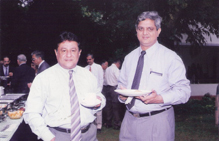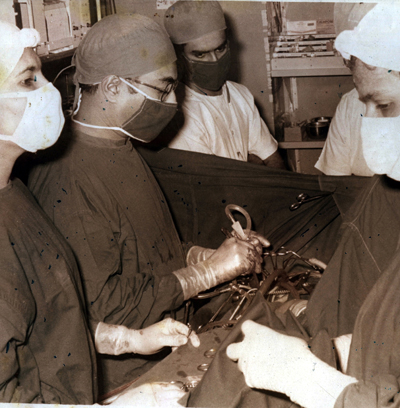
|
| Dr K M Cherian & Dr J S N Murthy |
Cardiothoracic surgeon, Dr. K.M. Cherian, with his long list of 'firsts' – India's first successful coronary artery graft, the first internal mammary artery graft, the first heart transplant in the private sector, the first paediatric heart transplant, and the first heart and lung transplant, with over 35,000 surgeries and astonishing success rates – remembers heading back to India, Perambur to be precise, at the age of 31, amidst disbelief among friends and colleagues in Australia and New Zealand.
"In May 1975, I found myself at the Railway Hospital in Perambur as a government employee on an ad hoc basis (with a salary of Rs.1047 per month, as an ad hoc AMO, the lowest rank), but as an independent cardiac surgeon. The mid to late 1970s was an exciting and satisfying period in my professional life, as I was given the opportunity to perform several surgeries for the first time in India; the first coronary artery bypass graft, correction of cardiac defects in infants using profound hypothermia, etc."
He remembers, "The hospital building reminded me of the Government Wenlock Hospital, Mangalore, where I did my clinical studies. Both were built by the British! I remember it was June 1975, a Friday, when my flight landed in Meenambakkam from Sydney. Madras was 35-38 degrees hot, no green at all, like a desert. Dr.TJC and Dr. Sankaran came to receive me. It was four in the evening when we went to the Gymkhana and I was treated to a mug of beer! We came to the ICF guesthouse, and then made a round of the hospital. I was rather disappointed, because the ICU had minimal facilities and was very basic.
"With help at hand from Dr. Sankaran and Dr. Premkumar, we made a heart lung machine work, calibrating it with a bucket of water! On Monday I did an open heart surgery, on Tuesday too, and thereafter every day of the rest of the week. That Friday I performed the first bypass surgery in the country, but did not know till Monday that it was so! By September that year, Dr. Girinath too joined us. Since I stayed at 119 Brock Road, just opposite the Hospital, any emergency meant I'd be running across in a lungi…everybody got used to seeing me in ICU in that attire!
"We had a lot of support from the Railway administration and Ministers. Even in 1975, besides railway staff and their family members, we operated on patients from Sri Lanka, Pakistan, Bangladesh and a few other Asian countries, probably the earliest instances of what is known today as 'Medical Tourism'.
"Along with the evolving science, we grew up too, faced success and failure, with many challenges. The hierarchy in Railway circles was legendary, but the Sunday after I joined, the GM, ICF, J. Mathan, called me over for lunch to his home. Others were surprised, and nobody believed me when I told them this!" Dr. KMC signs off with a smile.
 |
Dr. M.R. Girinath at the Railway Hospital. |
Current Chief of the Cardiac Surgery team at Apollo Hospitals, Chennai, Dr. M.R. Girinath, was 36 when he joined the PRH in mid-1975 as a specialist surgeon. With Dr. K.M. Cherian, he opened up many pathbreaking surgical frontiers. "The Railway Hospital was a unique organisation then because its possible users were 1.7 million employees who along with their dependents added up to 5 to 6 million. This meant plenty of heart cases and it provided a great start. Patients were referred to us from across the country. The work culture was tremendous and everyone wanted to do more and more! The Railways were very generous in supporting the infrastructure required. We were able to train many young surgeons who are now all over India. And the institution is still going strong with a dedicated team," says Dr. Girinath.
By 1977, the PRH was already an all-India referral centre for cardiovascular diseases, and the department offered a complete range of services including adult and paediatric cardiology, coronary and peripheral interventional procedures, and electrophysiology services. It has been a pioneer in coronary angioplasty and carotid stenting. The term cardiac anaesthesia as a sub-speciality of anaesthesia was coined in this hospital in 1977 by the late Dr. Kalyan Singh.
The Department of Cardiac Surgery at the PRH was soon recognised as one of the best cardiac surgery units in India, especially for complex congenital open heart surgeries in neonates and infants. This momentous first step had started a trend of specialisations at railway hospitals. Along the lines of Perambur, which focussed on cardiac care, Howrah developed as a centre for orthopaedics, Mumbai or plastic surgery, and Varanasi for oncology. For railway employees the facilities are available sans a price tag; outsiders are treated at a very reasonable cost.
By 1978, twin Operation Theatres with 20 beds with post-operation wards for cardiac patients were in place. All speciality departments were functional and the bed strength went up to 505. In January 1980, the first modern Cardiac Cath Lab was set up. The hospital was recognised by the National Board of Exams for Postgraduate Training in 1984, when the late Dr. Y.N. Mehrothra was the Chief Medical Officer. Dr. J.S.N. Murthy, its first candidate, was in 1988 also able to bring the Higher Education Link Scheme (HELS), a three-year academic programme, between Southern Railway Hospital and London University, with the help of Prof. Glennis Haworth, the late S.N. Kumar and Kartar Singh of the British Council, Dr. P. Srinivasan of the Jeevan Blood Bank, and with the support of the Railway administration.
By 1990 a new Cath Lab was in place including facilities like DSA, laser surgical unit, and video endoscopy. Two more new Cath Labs have since been added. The department is currently headed by Dr. Sriram Rajagopal.
|

